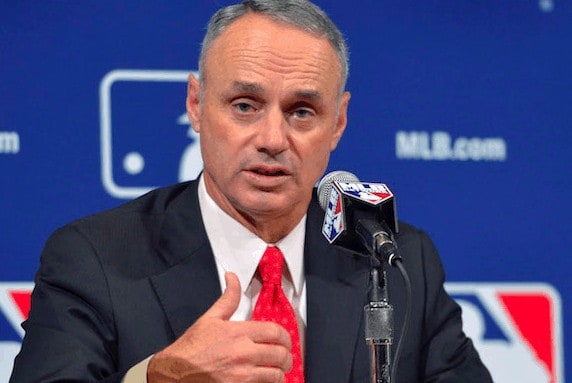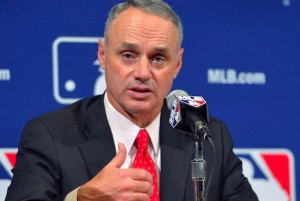Posted on December 28, 2016 by Bryan Zarpentine
With a new collective bargaining agreement being reached earlier this month, MLB Commissioner Rob Manfred figures to turn his full attention to what has been one of his biggest priorities since taking over the job almost two years ago: the pace of play in baseball. In an extensive interview with John Harper of the New York Daily News, Manfred spoke about, among other things, the changes he’d like to implement to create more action in baseball while also cutting down on the time it takes to play a game.
Manfred’s pace of play initiatives weren’t worked into the new CBA, but because of stipulations that allow for changes to playing rules in between labor agreements, he doesn’t need to wait until the next labor deal to make changes in the pace of play. Baseball has already moved to reduce the time between innings while also imploring batters not to step out of the batter’s box during at bats as often as they do. The next frontier of rules aimed at improving pace of play appears to be a pitch clock, which has already been utilized in the minor leagues.
“The reason I like the clock is not that I’m looking to force somebody to do something, but I think it is a constant reminder of the need to move things along, and I think that’s really important in terms of dealing with the pace-of-play issues,” Manfred explains. “It’s had great results in the minor leagues. Quantitative data shows that it made the games go faster, but equally important, players don’t complain about it. They get used to it and they work within it.”
However, forcing big league pitchers to worry about a pitch clock when facing the best hitters in the world is a whole lot different than putting pitch clocks in minor league games. To think that major leaguers won’t complain about it just because minor league pitchers haven’t done so is perhaps a little naive on Manfred’s end. Major league pitchers are at the peak of their profession and they thrive because they feel in control on the mound. Having to worry about a pitch clock would detract from that feeling of control.
Perhaps Manfred should be more patient and wait for the minor league pitch clock to have a trickle up effect. If minor league pitchers have adapted to the pitch clock, eventually more and more of those pitchers will reach the majors and instinctively take less time between pitches after working with a pitch clock throughout their minor league career. Over time, the pace of play will improve without having to implement a pitch clock in the majors.
Despite some obvious resistance at the idea of a pitch clock, Manfred insists that this and other changes are necessary for the health of the game. “The fact of the matter is the game is changing on its own, Manfred told Harper. “I think the issue for us is: it’s not change vs. no change. It’s change that’s organic or change that’s managed, and I do believe we need to manage the way the game is changing a little more aggressively.”
Whether Manfred will have enough support to force major league pitchers to adhere to a pitch clock or how soon we could see one in the big leagues remains unclear. However, Manfred is certainly going to try his best to make that and other changes aimed at improving pace of play in baseball. If the game is going to change, Manfred seems intent on making sure it changes on his terms.


